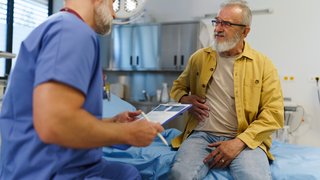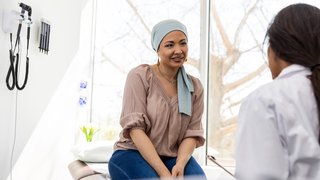Apples to apples: When is buying organic foods worth the price?
October 24, 2018

It’s no secret that proper nutrition can have a strong influence in preventing certain types of cancer. My patients often ask whether it’s worth the expense to buy organic fruits and vegetables compared to non-organic produce. Nationally, the demand for organic foods is increasing – sales rose 8.4 percent from 2015 to 2016 alone – so grocery stores have continued to boost their inventory accordingly.
To qualify as “organic” per the U.S. Food and Drug Administration (FDA), produce must be free of pesticides, which can be detrimental to our health. In fact, researchers are studying whether non-organic foods increase the risk of certain types of cancer, including breast cancer.
My gut response when patients ask about organic produce is that it’s beneficial to include fruits and vegetables whether they’re organic or not if the alternative is to have none. But that said, for certain fruits and vegetables, it’s best to choose organic options in order to avoid consuming pesticides.
Why pesticides can increase cancer risk
Many pesticides have estrogenic properties, which means the chemicals can increase estrogen levels in people who eat them. In certain patients, high estrogen levels can increase the risk of breast and ovarian cancer.
Research has suggested that pesticide consumption can increase the risk of lower sperm counts and breast cancer. One study took semen samples from 155 men over an 18-month period. In each sample, the concentration of sperm and its level of movement were evaluated by computer-aided semen analysis (CASA). The researchers found that men who ate produce with the highest levels of pesticide residues had a nearly 50 percent lower sperm count and more than 30 percent fewer normal sperm than men who consumed less pesticides.
Another study suggested that breast cancer risk increased in women who were exposed to high levels of the pesticide DDT when their mothers were pregnant. The study tracked nearly 15,000 mothers, daughters, and granddaughters. Although DDT was banned more than 40 years ago in the U.S. because of environmental concerns, many people still carry traces of it in their bodies.
Pro tip: Wash your produce to reduce pesticide residue. Washing also can help you avoid potentially harmful bacteria that wound up on the food during transport or while at the grocery store. I suggest using a diluted produce-washing solution of ammonia, which is a compound of nitrogen and hydrogen. Put one teaspoon in a clean sink full of water, wash your produce with it, and rinse the food thoroughly before eating.
When is it best to buy organic produce?
I recommend that patients go organic when purchasing fruits and vegetables that are eaten whole or that have edible skin, such as:
- Apples
- Blueberries
- Pears
- Strawberries
- Broccoli
- Kale
- Spinach
Produce that has thick skin that is typically removed before eating, such as oranges, bananas, and watermelon, typically are protected fairly well from pesticides. It’s less important to buy organic options for these foods. Just be sure to rinse the produce before slicing or eating it.
What about organic meat?
The FDA doesn’t allow farmers to give growth hormones to chickens, so I don’t consider it as crucial to buy organic chicken. If you can afford to go organic for just one type of meat, I recommend choosing organic, grass-fed beef, which doesn’t expose your body to added growth hormones. Higher blood levels of insulin-like growth factor (IGF), a hormone found in high levels in non-organic beef and milk, have been associated with an increased risk of prostate, breast, and other cancers.
If you’re on a budget, consider reducing your serving sizes of meat. For example, even though we Texans are proud of our big steaks, there’s no reason to eat an 8-ounce sirloin in one sitting. Three ounces is plenty – and eating less red meat might reduce your risk of certain types of cancer. Most Americans get way more protein than we need in our everyday diet anyway, so cutting back won’t deprive you of nutrients.
Buying local organic food in Dallas
Local organic produce can be healthier than organic produce shipped in from other regions. Typically, produce that is grown and sold locally is kept in the ground until it’s ripe, which maximizes the amount of nutrients in the food rather than being picked green and allowed to ripen over the course of hundreds or thousands of miles en route to the store. In Dallas, local organic fruits and vegetables are available at local farmers’ markets and food co-ops.
Remember, you’re better off eating non-organic produce than avoiding fruits and vegetables altogether. Don’t worry too much if your budget requires you to pick and choose which items you buy organic. Maximize what’s available by washing your produce before you eat it, opting for organic when the skin of the produce is edible, and eating smaller portions of meat – particularly beef.

Harold C. Simmons Comprehensive Cancer Center
Cancer Care at the Highest Level. Anywhere.
Our team of hundreds of leading cancer physicians and oncology-trained support staff is a trusted partner in returning patients with cancer to good health.










